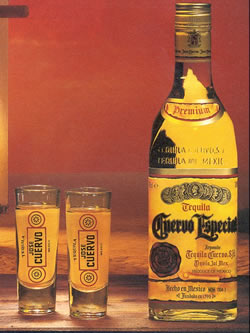Difference between Tequila and Other Alcohol
Key difference: An alcoholic beverage is a drink that contains ethyl alcohol (ethanol). There are a variety of different alcoholic beverages that can be consumed including beer, wine, champagne, and distilled spirits, or hard liquors such as vodka, whiskey, gin, rum, scotch, tequila, etc. Each drink differs in terms of flavor, appearance, process of making etc. Tequila is a distilled spirit that is composed from the blue agave plant.
 In chemistry, alcohol is an organic compound in which the hydroxyl functional group (-OH) is bound to a carbon atom. However, today the term ‘alcohol’ is more commonly synonymous with alcoholic beverages.
In chemistry, alcohol is an organic compound in which the hydroxyl functional group (-OH) is bound to a carbon atom. However, today the term ‘alcohol’ is more commonly synonymous with alcoholic beverages.
An alcoholic beverage is a drink that contains ethyl alcohol (ethanol). Ethanol is a psychoactive drug and is one of the oldest recreational drugs known to man. It is responsible for the state of alcohol intoxication in humans when consumed.
Alcoholic drinks serve a variety of purposes today. It is present at almost every event such as a party or a get-together. It can also be served as an ice breaker on a new date or as many people claim it help drown out sorrows and other worries. They have practically become a main part of our culture.
There are a variety of different alcoholic beverages that can be consumed including beer, wine, champagne, and distilled spirits, or hard liquors such as vodka, whiskey, gin, rum, scotch, tequila, etc. However, each drink differs in terms of flavor, appearance, process of making etc.
Most of the liquors are produced by a process of distillation. The distillation essentially gets rid of water and gives a purer spirit with higher alcohol content. These liquors are usually produced by a method of fermenting grain, fruit, or vegetables. Each different type of liquor is produced from a different source product.
Some of the common types of liquor include:
- Whiskey or whisky: a type of distilled alcoholic beverage made from any form of fermented grain mash. Depending on the geographical region or type of whiskey that is being made, whiskey can be made from barley, malted barley, rye, malted rye, wheat, and corn.
- Rums: distilled alcoholic beverages made from sugarcane byproducts such as molasses or sugarcane juices.
- Vodka: a distilled spirit that is composed of water and ethanol. It is made by distilling juices from various fermented substances such as grains, potatoes and sometimes sugar or fruit. The distillation from sugar and fruit are also sold as flavored vodka.
- Brandy (short for brandywine): a sprit that is distilled from wine, grapes and other fruit juices.
- Scotch or scotch whiskey: a type of whiskey that is processed in Scotland. It is originally made from malt barley, but during the 18th century distilleries started producing whiskies made from wheat and rye.
Tequila is another type of liquor. It is a distilled spirit that is composed from the blue agave plant. The blue agave plant grows primarily around the city of Tequila, Mexico. Hence, most tequila distilleries are located in the surrounding area. According to Mexican Law, tequila can be produced only in the state of Jalisco and limited regions in the states of Guanajuato, Michoacán, Nayarit, and Tamaulipas. However, it can be shipped in large quantities to the United States of America to be bottled, and eventually sold.
 Tequila was first produced in the 15th century. It generally has 38–40% alcohol content, which is 76–80 proof. Some types of tequila may be produced with an alcoholic content as low as 31% (62 proof) or as high as 55% (110 proof). However, these are uncommon.
Tequila was first produced in the 15th century. It generally has 38–40% alcohol content, which is 76–80 proof. Some types of tequila may be produced with an alcoholic content as low as 31% (62 proof) or as high as 55% (110 proof). However, these are uncommon.
Under Mexican Law, only tequila which is 100% agave can be sold as tequila. Even so, as per American Law, tequila which is 51% agave can be commercially labeled as tequila. These types of tequila are usually called mixtos in Mexico.
According to Wikipedia, there are 5 different types of tequila:
- Blanco (white) or plata (silver): white spirit, un-aged and bottled or stored immediately after distillation, or aged less than two months in stainless steel or neutral oak barrels
- Joven (young) or oro (gold): usually a mixto (rarely 100% agave) with added coloring
- Reposado (rested): aged a minimum of two months, but less than a year in oak barrels of any size
- Añejo (aged or vintage): aged a minimum of one year, but less than three years in small oak barrels
- Extra Añejo (extra aged or ultra aged): aged a minimum of three years in oak barrels.
Tequila is often drunk neat in form of shots. This is why tequila has a bad reputation for causing blackouts and hangovers. However, many of the premium tequilas are now sipped neat, in order to taste the flavor and to enjoy the liquor. Tequila may also be used to create cocktails, the most famous of which is the Margarita.
Image Courtesy: talktofrank.com, scottystarnes.wordpress.com









Add new comment